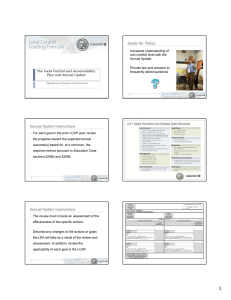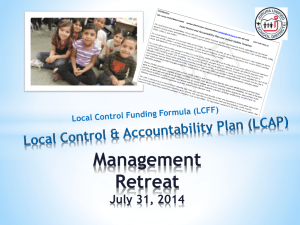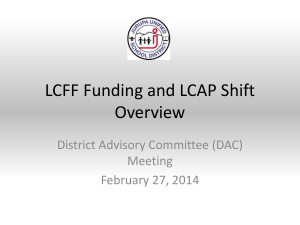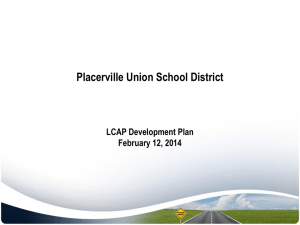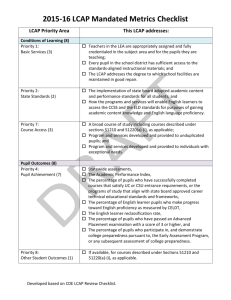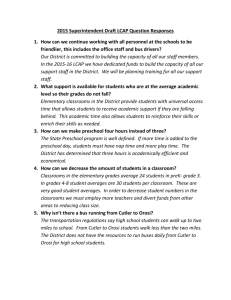LCFF, LCAP, Audit Perspectives MATT
advertisement
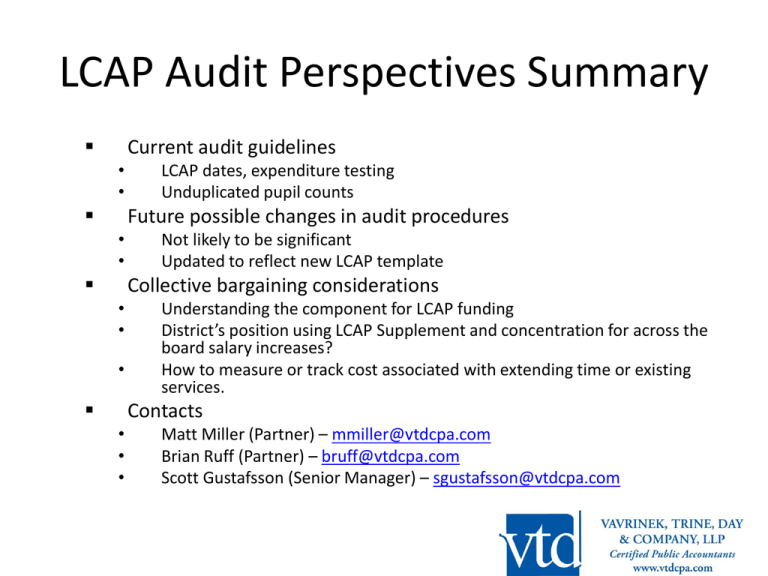
LCAP Audit Perspectives Summary Current audit guidelines • • LCAP dates, expenditure testing Unduplicated pupil counts Future possible changes in audit procedures • • Not likely to be significant Updated to reflect new LCAP template Collective bargaining considerations • • • Understanding the component for LCAP funding District’s position using LCAP Supplement and concentration for across the board salary increases? How to measure or track cost associated with extending time or existing services. Contacts • • • Matt Miller (Partner) – mmiller@vtdcpa.com Brian Ruff (Partner) – bruff@vtdcpa.com Scott Gustafsson (Senior Manager) – sgustafsson@vtdcpa.com LCAP Audit Perspectives Presented by: Matt Miller and Brian Ruff LCAP Audit Perspectives Helpful resources Current audit guidelines Future possible changes in audit procedures Collective bargaining considerations • Understanding the component for LCAP funding (Charter Schools cannot use prior year ADA when enrollment drops in current calculation). • District’s position using LCAP Supplement and concentration for across the board salary increases? • How to measure or track cost associated with extending time or existing services. Resources • CDE – http://www.cde.ca.gov/fg/aa/lc/lcfffaq.asp • (FAQ’s related to many areas of LCFF not just LCAP) – http://eaap.ca.gov/ • Education Audit Appeals Panel (Audit guide) – Schools Services of California • Good source for up to date legislative issues and guidance over common areas of concern Current Audit Guidelines • School Districts and COE for LCAP – Presented the LCAP or annual update to a parent advisory committee and an English learner parent advisory committee, if applicable – Notified the public of the opportunity to submit comments regarding actions and expenditures proposed in the LCAP or annual update – Held at least one public hearing – Adopted the LCAP or annual update in a public meeting • These audit procedures are not required for charter schools Current Audit Guidelines • For the 2014-15 annual audit for all LEAs – school districts, COEs, and charter schools: – Auditors will select samples of the actions or services in the LCAP’s existing Sections 3A and 3B that the LEA has noted as implemented and have generated actual expenditures and • examine that expenditures were made for the sample actions or services noted by the LEA • LEAs should work with their respective auditors to identify the actions or services for review Current Audit Guidelines • Tracking LCAP expenditures – There is no requirement for tracking expenditures through SACS (account codes) – There is still the need to know which expenditures belong to the goals outlined in your LCAP for audit purposes – Each LEA goes about this in their own way (color coded, folders, account coding, etc.) Current Audit Guidelines • Unduplicated Pupil Count – Audited each year to ensure accuracy of the count – Be aware of any issues noted during the audit sample as this may impact future funding and therefore current negotiations (If severe enough) – There were approximately 200 findings noted statewide in the 13-14 fiscal year related to this audit area Possible Future Changes • LCAP – Instead of sections 3A and 3B, the focus will be on “Section 2: Goals, Actions, Expenditures, and Progress Indicators” for 15-16 – As of now, there are no audit procedures related to testing the progress being made towards the LEA’s goals set forth in their LCAP Possible Future Changes • Unduplicated Pupil Count – Not likely to see significant changes in the near future related to these audit steps. • EAAP – Website should have most updated proposals for changes to current and upcoming audit years – Be in touch with your auditors Collective Bargaining Considerations • Significant impacts on collective bargaining – LEA’s funding drastically different from one another and therefore what one may be able to offer during bargaining can be largely different from others LEA’s in the area – Necessity to have bargaining units understand what all of the changes mean in context to avoid the “me too” effect Collective Bargaining Considerations • Understanding the components for LCAP funding – (Charter Schools cannot use prior year ADA when enrollment drops in current calculation). • District’s position using LCAP Supplement and concentration for across the board salary increases? • Understanding the GAP increases over the next 6 years • How to measure or track cost associated with extending time or existing services. • Not meeting standard or expected improvements? • Questions?
